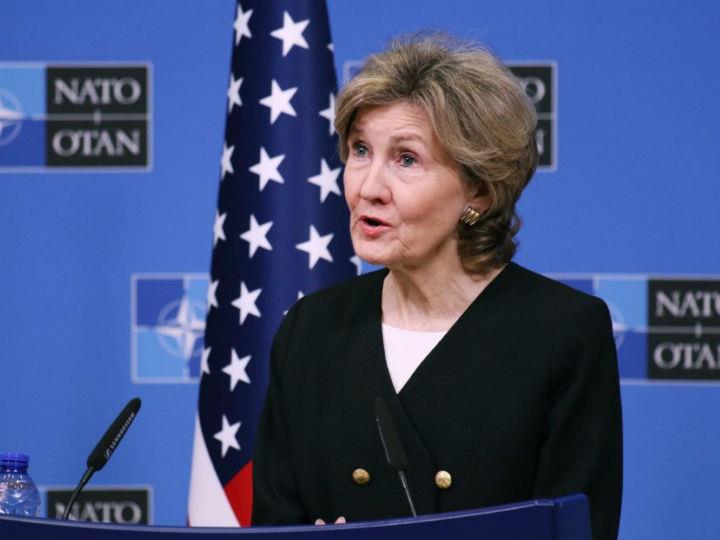by Alexandra Brzozowski
At the same time, NATO secretary-general confirmed that President Donald Trump had decided on the withdrawal without informing the alliance in advance.
On Monday (15 June), US President Donald Trump confirmed previous media reports he will halve the number of US troops in Germany from 52,000 to 25,000 because Berlin is “delinquent” in contributions to NATO and treats the United States “badly” on trade.
According to reports, Trump took this decision, angered by the refusal of German Chancellor Angela Merkel to attend physically a G7 summit hosted by the US.
Asked whether the troop withdrawal could be seen as the first sign of a US retreat from Europe, Ambassador Kay Bailey Hutchinson stressed that the US is showing its commitment in Europe with military exercises, in the Enhanced Forward Presence in Europe’s East and the continuing large amount of bases and troops stationed throughout Europe, including Germany.
“Most certainly, there is no sign of American retreat from Europe, America is deeply committed and more committed than ever in Europe,” she said. “No one should ever think that America is walking away from Europe in any way.”
Although there would be no concrete timeframe for the withdrawal yet, Hutchinson also said that “there is no plan whatsoever right now about where those troops should go”.
Poland has been quick to offer to host some of these forces, after Warsaw presented a grand proposal in 2018 to name a military base in honour of Trump, in return for increased permanent US presence on its territory.
“There’s a lot of planning where troops would be deployed and a very large number are going to stay in Germany, but there may be others that would rotate out,” she added.
It is the latest in a series of US military decisions that have caught allies off-guard in recent months, including the US troop withdrawal from Northern Syria and the targeted killing of an Iranian general, Qassem Soleimani, which forced NATO to suspend its training mission in Iraq earlier this year.
The withdrawal plans have yet again taken NATO allies by surprise, with NATO Secretary-General Jens Stoltenberg confirming on Tuesday (17 June) that US President Trump did not inform the alliance before deciding his withdrawal plans.
Asked whether such a move would send a bad message to allies, Hutchinson said that previous “military-to-military communications certainly have included looking at troop deployment and troop placement.”
Libya
Senior EU officials have floated the idea that the bloc could soon make the case for NATO’s participation in Operation Irini with the military alliance’s Operation Sea Guardian in the eastern Mediterranean.
Responding to a question whether such cooperation could take place, Hutchinson said that while “everyone is is very concerned about Russia’s activities in Libya as well as Syria and the destabilisation of those countries that is being caused by the Russian activities”, “NATO is not taking a position on Libya, which is not to say that it wouldn’t happen down the road”.
Asked what Washington would expect from Turkey, NATO member and a proxy in the conflict, Hutchinson said she would “hope that the Turkish government would not be a major player in the upsets that are happening in Libya”.
Warring parties “should not be helped or abetted either by Turkey or by Russia or other countries outside”, she added.
Arms control
With the only remaining nuclear arms control treaty between the two largest nuclear powers poised to expire in less than a year, the US and Russia have agreed to start nuclear arms negotiations in June.
Hutchinson said arms control talks are set to happen between Russia and the United States next week, but “nuclear non-proliferation should be trilateral”.
China, which has not been part of agreements to limit nuclear arsenals in the past, has been invited to join but announced it would not take part in such talks.
“No doesn’t always mean no,” Hutchinson said when asked if she expects Beijing to change its mind. “We want to have China encouraged to come in, they could be a player in the world in a rules-based order, and we hope that they will.”
“So far, they are not showing an interest in doing so,” she added.
*first published in: www.euractiv.com




 By: N. Peter Kramer
By: N. Peter Kramer
